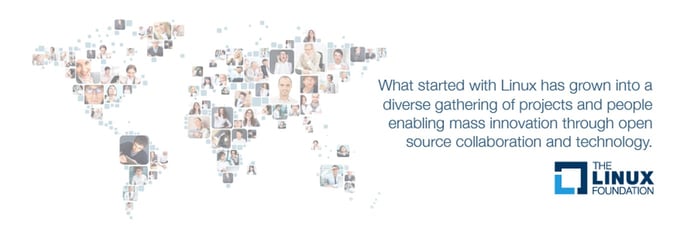
TL; DR: The Linux Foundation helps open-source communities accelerate technological development through a support system where they can share, learn, and collaborate. The nonprofit works to train the next generation of open-source developers while uniting their interests with those of corporate executives. With a comprehensive slate of events and a forward-thinking focus on the 5G revolution and emerging tech regions, the Linux Foundation is prepared to support open-source communities into 2019 and beyond.
There’s a pervasive myth surrounding open-source software, and squashing it will unlock incredible opportunity, said Clyde Seepersad, General Manager, Training & Certification at the Linux Foundation.
“We have to let go of this strange, almost macho, idea that you’re a weakling in open-source if you have to be trained on it — that you’re supposed to figure it out yourself,” he said. “Open-source software is just like any other software: You learn it best if you’re actually taught it. If we expect our employees to magically figure it out on nights and weekends, we’re fooling ourselves.”

Angela Brown, General Manager, Events, and Clyde Seepersad, General Manager, Training & Certification, gave us the scoop on the Linux Foundation.
At the Linux Foundation, Clyde helps developers and other professionals invest in their skills through a range of training and certification programs. The organization provides affordable, vendor-neutral educational opportunities that help students gain baseline knowledge in open-source software.
Angela Brown, General Manager, Events at the Linux Foundation, said open-source technology has transformed the tech industry, and the foundation has made significant contributions along the way. “We play a key role in helping build communities around projects that are making a huge impact on technology all over the world,” she said. “That’s really exciting to me.”
Today, the Linux Foundation continues to create an environment where the open-source community can share ideas, gain education, and work together to move the industry forward. The nonprofit is working to train the next generation of developers, as well as corporate executives, on the intricacies of open-source software. Going into 2019, the Linux Foundation aims to provide a robust schedule of educational and training events with a focus on relevant trends and emerging tech regions.
Share, Learn, and Collaborate with Global Open-Source Communities
Angela, who recently wrapped up KubeCon + CloudNativeCon North America 2018 in Seattle, has seen conference participation increase drastically over the past few years. “We sold out,” she said of the Seattle event. “We have more than 8,000 people; whereas three years ago there were 500 people at this event.”
The Linux Foundation expects a roster of more than 12,000 people at KubeCon + CloudNativeCon North America 2019, and more than 8,000 attendees at KubeCon + CloudNativeCon Europe 2019. And that’s just one event: The Linux Foundation offers a smorgasbord of conferences geared toward a variety of users across the globe.
At the Linux Foundation Open Source Leadership Summit, for example, leaders gather to advance open-source technologies and learn how to collectively manage shared technological investments. Angela said the summit encourages innovation, growth, and collaboration.

The Linux Foundation is a global community of open-source innovators.
“The Open Source Summit serves two wonderful purposes,” Angela said. “First, it becomes a launch pad for technology that’s in the early adopter phase. Second, we use the events to showcase the community side of open-source.”
Even though the conference is primarily technical, the Linux Foundation has several tracks focused on community management, leadership, and diversity and inclusion. “That’s really important, especially when you talk about recruiting and getting more people in the funnel for all of the jobs that continue to open up in this space,” Angela said.
A Focus on Talent: Training the Next Generation of Linux Developers
Clyde said Linux Foundation is maniacally focused on hands-on skills development. “We focus hard on activities and labs, and our courses don’t feature a lot of videos,” he said. “I get flack for that sometimes, but we’re here to teach you how to use software, not entertain you. It’s about rolling up your sleeves because the only way to learn is to do.”
Ultimately, open-source projects won’t succeed without a cadre of human talent to develop, run, and administer them — and that’s why Linux Foundation is laser-focused on skill building. Clyde said the foundation primarily focuses on entry-level courses. “Our view is once you’ve achieved baseline familiarity, we’ve succeeded in bringing you into the talent pool,” he said.

The forward-thinking foundation is securing our open-source future.
Moving forward, students have the option to take their skills to the next level through open-source certifications, which verify an individual has the knowledge necessary to perform real-world tasks. Clyde said hiring managers are increasingly prioritizing certifications when sourcing potential candidates. Professionals who are certified with the Linux Foundation can prove their skills to prospective employees.
“Our certification exams are based on live system examples — they’re not multiple choice,” Clyde said. “If you can pass one of these exams, that shows competence. And if you’re an employer on a hot new project trying to hire, say, a Kubernetes professional, certification on a performance-based exam proves a candidate is not blowing smoke.”
Code in the Boardroom: Uniting Developers and C-Suite Executives
In addition to technical audiences, the Linux Foundation provides valuable training and educational services to the general business population. Angela said more than 1,200 CEOs attended the group’s events this year. The group also has a portfolio of free massive open online courses (MOOCs) geared toward business leaders on the online learning platform edX.
“The idea behind those is to provide general introductions, whether you’re a business person trying to get your head around blockchain and distributed ledger technologies or you’re trying to understand more about 5G technology,” Clyde said. “We have a really big catalog, and we’re constantly adding to it.”
The MOOCs, available at no charge, help learners gain a general awareness of higher-level concepts, and there’s no hidden agenda or sales pressure. The foundation’s ultimate goal, Clyde said, is to bring people together, whether through training or events. “It’s not just about coding, it’s about building communities, building expertise,” he said. “It’s code plus people.”
Angela agreed. “Open-source is about development, but you need the community to function properly to make it work,” she said. “If you don’t have the community piece there, it doesn’t.”
From the developer’s perspective, face-to-face collaboration opens doors to innovation. The open-source community is famously widespread and open to participation from parties worldwide. But Angela said there’s no substitute for in-person interaction.
“The sort of work that can happen in real time is amazing: producing code together, problem-solving, building relationships so you trust that person on the other side of the world that you have never met before,” she said. “And that’s in addition to building skills and learning about new technology.”
Up Next: A Focus on the 5G Revolution and Emerging Tech Regions
Looking toward the future, Clyde said many professionals underestimate the impact of the coming 5G revolution. The fifth generation of mobile broadband will bring better connectivity, lower latency, and greater energy savings than ever before.
“It’s just starting to become real for folks,” he said. “You have to consider how to get on board and make yourself technically competent as well as how to make the technology part of your business strategy. I think that’s going to be the ‘Aha!’ moment for most people next year.”
The Linux Foundation aims to prepare users for the change going into the coming year while focusing on outreach to developers in emerging tech regions. For example, the group plans to build up educational offerings in China, where Angela said there is an enormous amount of potential. “We’re trying to make sure that we can help the Chinese development community integrate with the global community,” she said.
In 2019, Linux Foundation will combine KubeCon China, CloudNativeCon China, and the Open Source Summit China into one event. The move will allow for substantially lower registration fees, making the event more accessible. “This will allow us to simultaneously translate all sessions, which is really important because language is a huge barrier,” Angela said. “We did this successfully about a decade ago in Japan and are looking to mirror it in China.”
Linux Foundation will also launch small, one-day events in South America, Asia, and India, including a Kubernetes Day event in Bangalore. “We know that there is a desire for the education and collaboration there and also the capability for us to help local folks,” Angela said.
HostingAdvice.com is a free online resource that offers valuable content and comparison services to users. To keep this resource 100% free, we receive compensation from many of the offers listed on the site. Along with key review factors, this compensation may impact how and where products appear across the site (including, for example, the order in which they appear). HostingAdvice.com does not include the entire universe of available offers. Editorial opinions expressed on the site are strictly our own and are not provided, endorsed, or approved by advertisers.
Our site is committed to publishing independent, accurate content guided by strict editorial guidelines. Before articles and reviews are published on our site, they undergo a thorough review process performed by a team of independent editors and subject-matter experts to ensure the content’s accuracy, timeliness, and impartiality. Our editorial team is separate and independent of our site’s advertisers, and the opinions they express on our site are their own. To read more about our team members and their editorial backgrounds, please visit our site’s About page.

